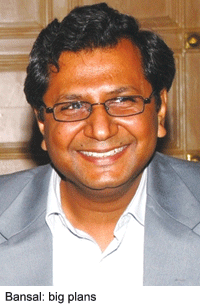With the global economic meltdown forcing corporates worldwide to cut costs, India’s once-booming IT sector, which increased its headcount to over 1 million in 2008, can no longer afford to spend millions on in-house training for new recruits. This ill wind for the IT industry is blowing favourably for the innovative Bangalore-based upskilling company A Plus Education Solutions Pvt Ltd, co-promoted by Amit Bansal in 2006. Now India’s much-lionised IT corporates and mint fresh engineering graduates need his services more than ever.
 An electronics and communications engineer of the Punjab Engineering College, Chandigarh with an MBA in marketing from XLRI, Jamshedpur, Bansal began his career in the paints industry as a marketing manager of Asian Paints. Two years later he entered the IT industry by signing up with Riverrun, a Delhi-based startup focused on delivering hand-held mobile customer solutions before moving on to the Seattle-based Talisma Corp, one of the biggest players in the CRM products space, in 2001.
An electronics and communications engineer of the Punjab Engineering College, Chandigarh with an MBA in marketing from XLRI, Jamshedpur, Bansal began his career in the paints industry as a marketing manager of Asian Paints. Two years later he entered the IT industry by signing up with Riverrun, a Delhi-based startup focused on delivering hand-held mobile customer solutions before moving on to the Seattle-based Talisma Corp, one of the biggest players in the CRM products space, in 2001.
While working with Talisma, Bansal discerned a new business opportunity. “Indian engineering students knew their classroom theory well, but had no idea how to apply the concepts they learned to actual projects. If you were to ask them about the software development cycle they could write 2-3 pages on it, but they had no idea how to actually create a software application. It’s like carpentry students who know the names of all tools but have never learned to build a table,” says Bansal, who estimates that IT companies spend Rs.1 lakh on training every new graduate over a period of four-six months.
To address this growing gap between engineering education and on-the-job productivity, together with two like-minded professionals, Vinay Nijhawan and Chandrashekhar Shetty, Bansal co-founded A Plus Education, which markets its services under the brand name PurpleLeap, to upskill and train graduates for industry. Currently 1,000 students are enroled in its four certificate programmes preparing them for careers in IT programming and testing, infrastructure management, and insurance. Each 400-hour certificate programme is beamed via satellite and supplemented with internet portal and onsite trainer visits, into 50 learning centres in 40 colleges in 30 cities countrywide.
“Students enroled in colleges in tier II cities and small towns are particularly under-served by way of acceptable quality top-up education which would make them industry ready. Hence we came up with the idea of establishing fully-wired career centres in non-metro towns, into which we beam lectures from expert faculty and guest speakers via satellite technology. Though there’s no face-to-face interaction, students receive personal consultation from instructors and follow a highly monitored programme online,” he says.
With demand for PurpleLeap’s services rising, Bansal has made big plans for the future. “We hope to expand our operations to 1,000 colleges churning out 10 percent of India’s skilled and semi-skilled workforce in the next five years. Students’ project assign-ments will be executed in simulated workplace environments and monitored by web 2.0 technology which enables discussion forums, web conferencing and voice-over IP capabilities. Next year, we expect the number of students registered with PurpleLeap to rise to 5,000. We’re late entrants perhaps, but we have the advantage of cutting-edge technology. And we’re in a hurry,” says Bansal.
Paige Aarhus (Bangalore)